Unit 2 How often do you exercise?Section B 3a-selfcheck 课件(共36张PPT)
文档属性
| 名称 | Unit 2 How often do you exercise?Section B 3a-selfcheck 课件(共36张PPT) | 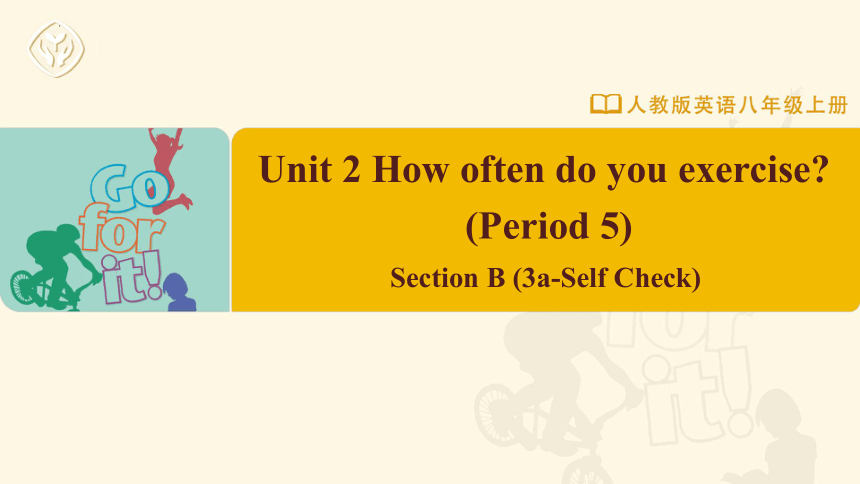 | |
| 格式 | pptx | ||
| 文件大小 | 2.6MB | ||
| 资源类型 | 教案 | ||
| 版本资源 | 人教新目标(Go for it)版 | ||
| 科目 | 英语 | ||
| 更新时间 | 2023-08-11 22:33:05 | ||
图片预览

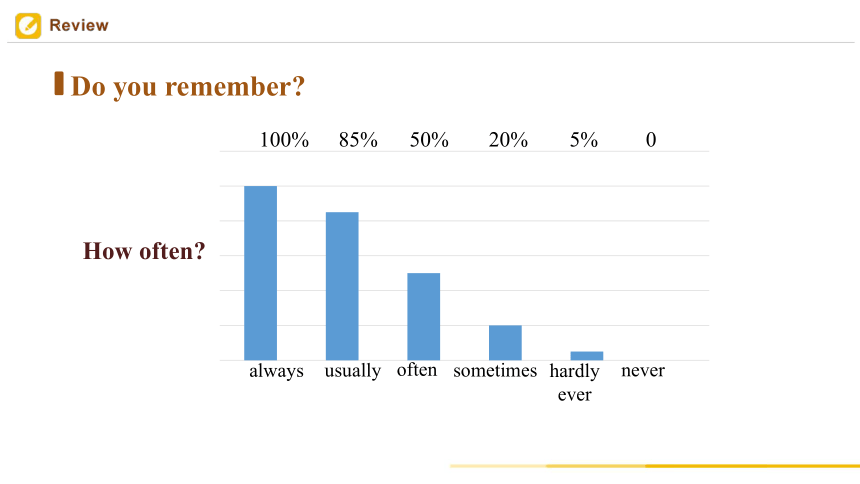
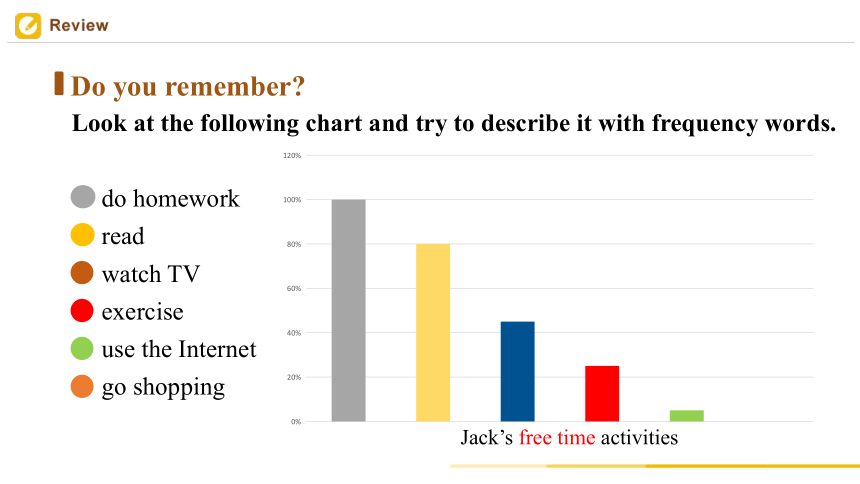
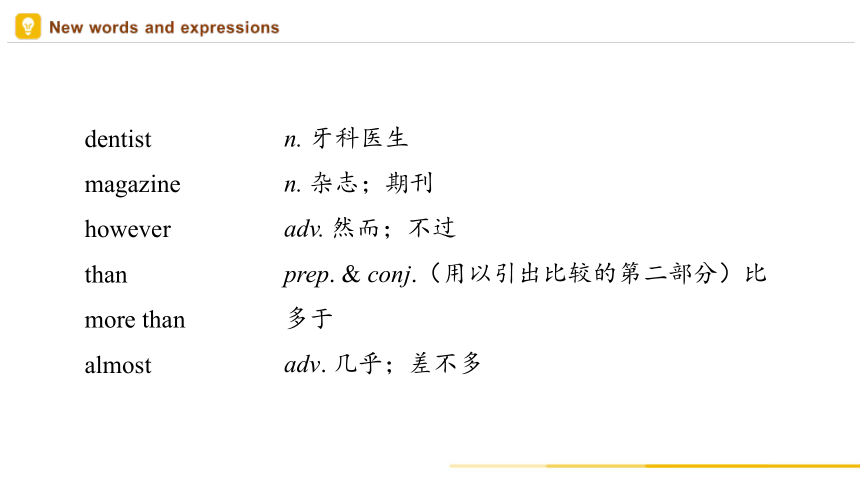
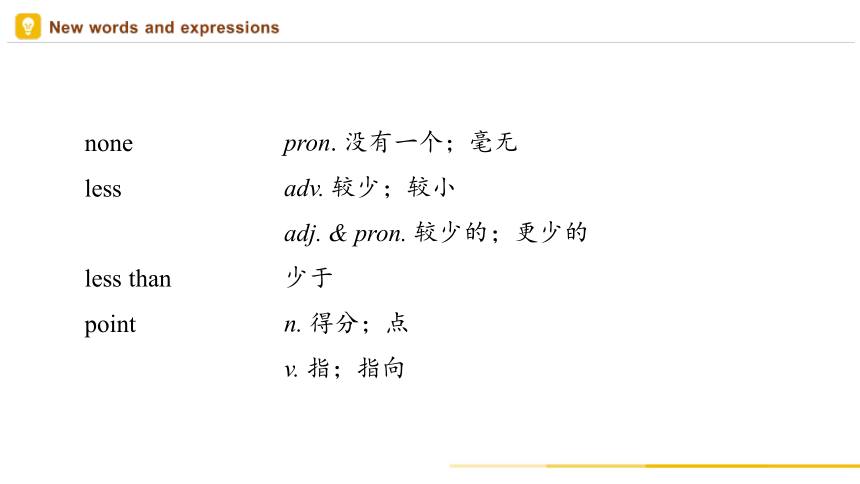
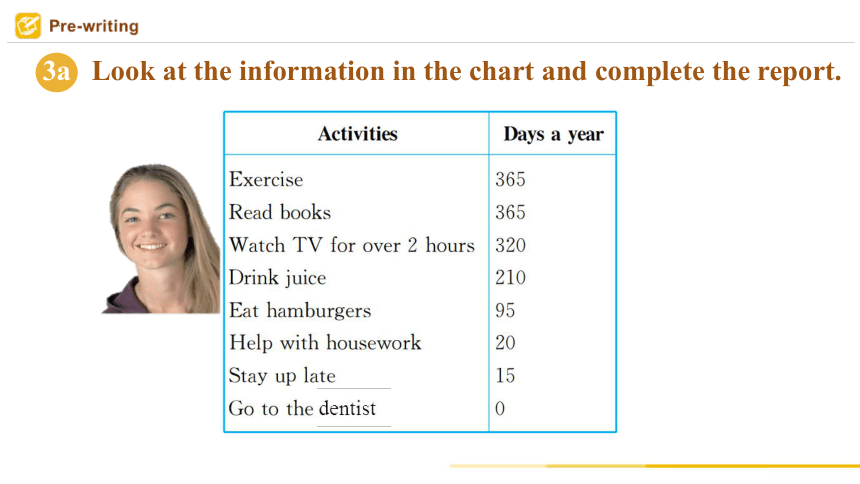
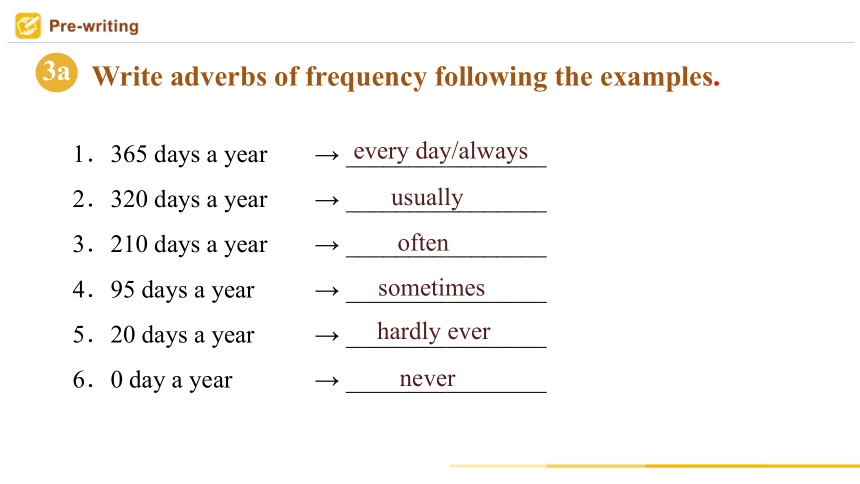
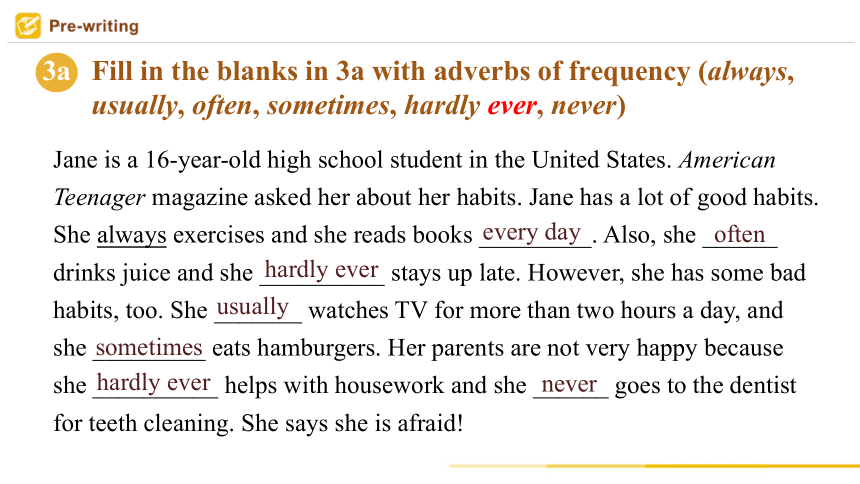
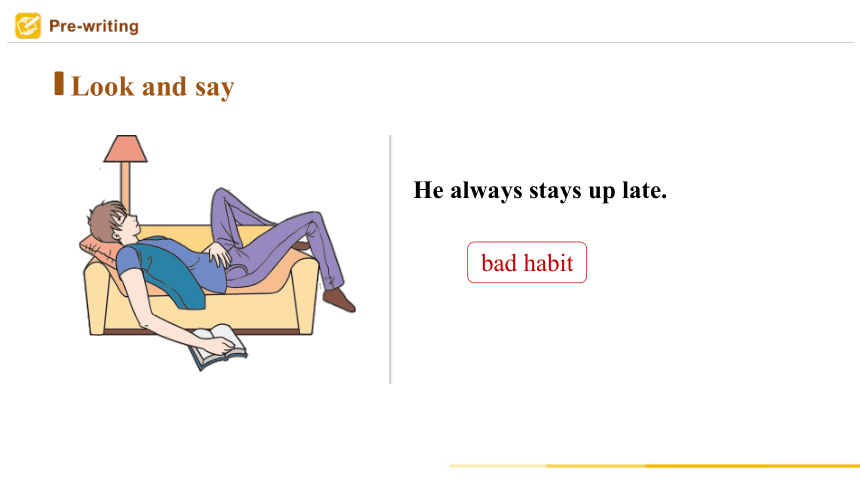

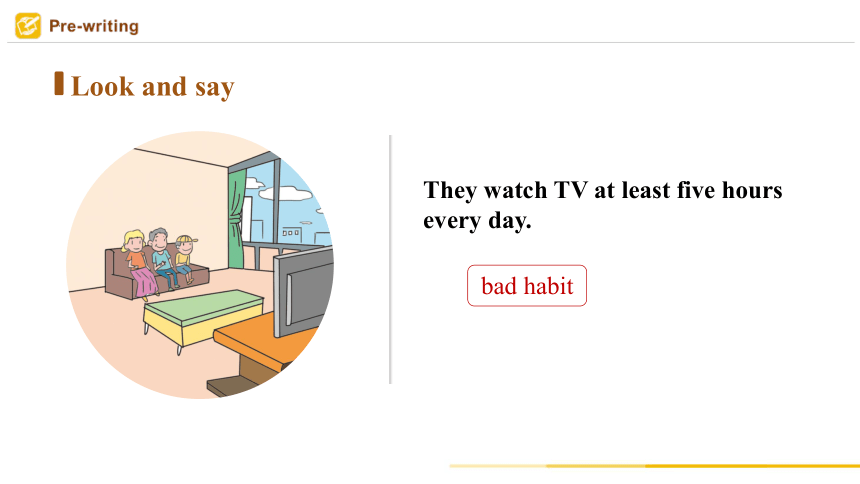

文档简介
(共36张PPT)
Unit 2 How often do you exercise
(Period 5)
Section B (3a-Self Check)
Do you remember
100%
85%
50%
20%
5%
0
always
usually
often
sometimes
hardly
ever
never
How often
Do you remember
Look at the following chart and try to describe it with frequency words.
Jack’s free time activities
do homework
read
watch TV
exercise
use the Internet
go shopping
dentist
magazine
however
than
more than
almost
n. 牙科医生
n. 杂志;期刊
adv. 然而;不过
prep. & conj.(用以引出比较的第二部分)比
多于
adv. 几乎;差不多
none
less
less than
point
pron. 没有一个;毫无
adv. 较少;较小
adj. & pron. 较少的;更少的
少于
n. 得分;点
v. 指;指向
3a
Look at the information in the chart and complete the report.
1.365 days a year → ________________
2.320 days a year → ________________
3.210 days a year → ________________
4.95 days a year → ________________
5.20 days a year → ________________
6.0 day a year → ________________
every day/always
usually
often
sometimes
hardly ever
never
3a
Write adverbs of frequency following the examples.
3a
Fill in the blanks in 3a with adverbs of frequency (always, usually, often, sometimes, hardly ever, never)
Jane is a 16-year-old high school student in the United States. American Teenager magazine asked her about her habits. Jane has a lot of good habits. She always exercises and she reads books _________. Also, she ______ drinks juice and she __________ stays up late. However, she has some bad habits, too. She _______ watches TV for more than two hours a day, and she _________ eats hamburgers. Her parents are not very happy because she __________ helps with housework and she ______ goes to the dentist for teeth cleaning. She says she is afraid!
every day
usually
often
sometimes
hardly ever
never
hardly ever
bad habit
He always stays up late.
Look and say
Look and say
good habit
She goes to bed and gets up early every day.
They watch TV at least five hours every day.
Look and say
bad habit
Look and say
good habit
He likes eating fruit, and he never eats junk food.
3b
Complete the chart with your own information. In the last column, use expressions like always, every day, twice a week and never.
Activities How often
Good habits
Bad habits
注意事项:
将一项活动和其频率结合起来,从而判断它是否健康。如 help with housework 是一个好习惯,但如果一年只做几次,就不是一个好习惯。
Talk about one of your friends’ habits with your partner. Judge which ones are good and which ones are bad.
Discuss
good habit
bad habit
or
3c
Write a report about your good and bad habits. Say how often you do things. Use the report in 3a as an example.
______________________________________________________________________________________________________________________________________________________________________________________________________________________________________________________________________________________________________________________________________________________
The writing steps
1.I am a … -year-old middle school student.
2.I have a lot of good habits. …
3.However, I have some bad habits, too. …
1.时态:一般现在时。
2.人称:用第一人称。
Check your writing
Exchange and check your writing with your partner. Then polish your writing.
4
Take the healthy pare your results with your partner’s. Who’s healthier
1.How often do you eat breakfast
a.Never. b.A few times a week. c.Almost every day.
2.How often do you eat fast food
a.Never. b.A few times a week. c.Almost every day.
3.How often do you eat vegetables and fruit
a.Never. b.A few times a week. c.Almost every day.
4
Take the healthy pare your results with your partner’s. Who’s healthier
4.How often do you exercise
a.A few times a year. b.A few times a month.
c.A few times a week.
5.How many hours do you watch TV every week
a.None. b.One to four. c.Five or more.
6.How many hours do you usually sleep at night
a.Less than six. b.Six or seven. c.Eight or more.
Are you healthy
1.a =0, b=1, c=2
2.a=2, b=1, c=0
3.a=0, b=1, c=2
4.a=0, b=1, c=2
5.a=2, b=1, c=0
6.a=0, b=1, c=2
9-12 points:
You’re really healthy!
Good for you—and your health!
4-8 points:
You’re smart about health most of the time.
0-3 points:
You have to learn more about healthy habits.
Don’t worry—you can do it!
1.Jane is a 16-year-old high school student in the United States.
简是一名十六岁的美国高中生。
16-year-old 意为“十六岁的”,它是由“数词 + 名词 + 形容词”
构成的复合形容词,中间用连字符连接,其中名词要用单数形式。
e.g. Lucy, an eight-year-old girl, won the prize.
八岁女孩露茜获得了这个奖项。
This is a ten-meter-long ladder.
这是一架十米长的梯子。
2.However, she has some bad habits, too.
然而,她也有一些坏习惯。
however 副词,意为“然而;不过”。
e.g. He lives a hard life. However, he feels happy.
他过着艰苦的生活,然而,他觉得幸福。
辨析
however 与 but
however 表示“然而”时是副词,不能直接连接两个分句;必须用
逗号隔开,表示补充;
but 连词,直接引出分句,其后一般不使用逗号,表示转折。
注意:
一般情况下,当 however 用作副词位于句首时,其后加逗号;当它位于句中时,其前后都要加逗号;当它位于句末时,其前要加逗号。
2.However, she has some bad habits, too.
然而,她也有一些坏习惯。
however 副词,意为“然而;不过”。
e.g. He lives a hard life. However, he feels happy.
他过着艰苦的生活,然而,他觉得幸福。
辨析
however 与 but
e.g. My father knows that it is not good to smoke. However, he can’t
give up smoking.
我的父亲知道吸烟不好。然而,他却戒不了。
I called you, but you did not answer.
我给你打过电话,但是你没有接。
3.She usually watches TV for more than two hours a day ...
她通常每天看电视超过两个小时……
more than 意为“多于;超过”,其后常接表示数量的词,
相当于 over。
e.g. There are more than fifty students in the classroom.
教室里有五十多名学生。
注意:
“more than + 数词 + 可数名词的复数形式”做主语时,谓语动词要用复数形式。
4.Almost every day. 几乎每天。
almost 副词,意为“几乎;差不多”。常位于实义动词之前,
系动词、助动词或情态动词之后。almost 不能置于句末。
e.g. I almost forgot to tell you the news.
我几乎忘记了要告诉你这个消息。
There is almost nothing in the room.
房间里几乎没有东西。
注意:
almost 一般不和 not 连用,但 almost 可以和 no、none、nothing,以及never 连用。
5.None. 一点儿也不看。
none 不定代词,意为“没有一个;毫无”,既可指人也可指物。
e.g. None of us enjoy staying up late.
我们没有人喜欢熬夜。
None of the money on the table is mine.
桌子上的钱没有一分是我的。
注意:
none of 与不可数名词连用做主语时,谓语动词用单数形式;与可数名词连用做主语时,谓语动词用单复数形式皆可。
5.None. 一点儿也不看。
辨析
none 与 no one
none no one
可指人或物 只能指人
其后常与 of 连用 其后不能与 of 连用
做主语时,谓语动词用单数或复数形式 做主语时,谓语动词用单数形式
常用于回答 how many/much 引导的特殊疑问句或含有“any + 名词”的一般疑问句 常用于回答 who 引导的特殊疑问句或含有 anyone、anybody 的一般疑问句
5.None. 一点儿也不看。
辨析
none 与 no one
—How many students are there in the classroom 教室里有多少学生?
—None. 一个也没有。
—How much money do you have on you 你身上有多少钱?
—None. 一点儿也没有。
—Who is in the next room 谁在隔壁?
—No one. 没有人。
—Is there anyone at home 家里有人吗?
—No one. 没有人。
6.Less than six. 少于6个小时。
less than 意为“少于”,反义短语是 more than,意为“超过;多于”。
e.g. The young man is less than twenty years old.
这个年轻人不到20岁。
拓展
less ... than 意为“比……少;不如……多”,常用于事物之间的比较。
e.g. We drink less coffee than tea.
我们喝咖啡不如喝茶多。
7.9-12 points: You’re really healthy! 9到12分:你很健康!
point 做可数名词,意为“得分;点”。
e.g. The first player to get 10 points is the winner.
第一个得10分的选手就是获胜者。
拓展
point 还可做动词,意为“指;指向”。常见搭配:point at/to“指向”(at 侧重所指对象;to 侧重所指方向)。
e.g. He pointed at this cup and said, “Whose is it ”
他指着这个杯子说:“它是谁的?”
He pointed to the high mountain far away.
他指向远处的那座高山。
Self Check
Complete the chart with activities you do and don’t do.
What about your mother/father
1
always usually often sometimes hardly ever never
I
My mother or father
Self Check
Write five sentences using the information above.
2
______________________________________________________________________________________________________________________________________________________________________________________________________________________________________________________________________________________________________________________________________________________
Self Check
Fill in the blanks in the conversation.
3
A: What do Tom and Mike ________ do on weekends
B: They sometimes go to the museum.
A: _________ do they go to the shopping center
B: ______ ever. Maybe about twice a month.
A: _________ do they watch TV
B: Mike never watches TV, but Tom watches TV ______ day.
A: Oh, I’m just like Tom. I ______ watch TV, too.
usually
How often
Hardly
How often
every
always
复合形容词以及however、more than、almost、
none、less than、point
知识要点
1.I am a … -year-old middle school student.
2.I have a lot of good habits. …
3.However, I have some bad habits, too. …
写作步骤
Write a short passage according to the information in Self Check 1 about your father or mother. Give advice on the bad habits.
Unit 2 How often do you exercise
(Period 5)
Section B (3a-Self Check)
Do you remember
100%
85%
50%
20%
5%
0
always
usually
often
sometimes
hardly
ever
never
How often
Do you remember
Look at the following chart and try to describe it with frequency words.
Jack’s free time activities
do homework
read
watch TV
exercise
use the Internet
go shopping
dentist
magazine
however
than
more than
almost
n. 牙科医生
n. 杂志;期刊
adv. 然而;不过
prep. & conj.(用以引出比较的第二部分)比
多于
adv. 几乎;差不多
none
less
less than
point
pron. 没有一个;毫无
adv. 较少;较小
adj. & pron. 较少的;更少的
少于
n. 得分;点
v. 指;指向
3a
Look at the information in the chart and complete the report.
1.365 days a year → ________________
2.320 days a year → ________________
3.210 days a year → ________________
4.95 days a year → ________________
5.20 days a year → ________________
6.0 day a year → ________________
every day/always
usually
often
sometimes
hardly ever
never
3a
Write adverbs of frequency following the examples.
3a
Fill in the blanks in 3a with adverbs of frequency (always, usually, often, sometimes, hardly ever, never)
Jane is a 16-year-old high school student in the United States. American Teenager magazine asked her about her habits. Jane has a lot of good habits. She always exercises and she reads books _________. Also, she ______ drinks juice and she __________ stays up late. However, she has some bad habits, too. She _______ watches TV for more than two hours a day, and she _________ eats hamburgers. Her parents are not very happy because she __________ helps with housework and she ______ goes to the dentist for teeth cleaning. She says she is afraid!
every day
usually
often
sometimes
hardly ever
never
hardly ever
bad habit
He always stays up late.
Look and say
Look and say
good habit
She goes to bed and gets up early every day.
They watch TV at least five hours every day.
Look and say
bad habit
Look and say
good habit
He likes eating fruit, and he never eats junk food.
3b
Complete the chart with your own information. In the last column, use expressions like always, every day, twice a week and never.
Activities How often
Good habits
Bad habits
注意事项:
将一项活动和其频率结合起来,从而判断它是否健康。如 help with housework 是一个好习惯,但如果一年只做几次,就不是一个好习惯。
Talk about one of your friends’ habits with your partner. Judge which ones are good and which ones are bad.
Discuss
good habit
bad habit
or
3c
Write a report about your good and bad habits. Say how often you do things. Use the report in 3a as an example.
______________________________________________________________________________________________________________________________________________________________________________________________________________________________________________________________________________________________________________________________________________________
The writing steps
1.I am a … -year-old middle school student.
2.I have a lot of good habits. …
3.However, I have some bad habits, too. …
1.时态:一般现在时。
2.人称:用第一人称。
Check your writing
Exchange and check your writing with your partner. Then polish your writing.
4
Take the healthy pare your results with your partner’s. Who’s healthier
1.How often do you eat breakfast
a.Never. b.A few times a week. c.Almost every day.
2.How often do you eat fast food
a.Never. b.A few times a week. c.Almost every day.
3.How often do you eat vegetables and fruit
a.Never. b.A few times a week. c.Almost every day.
4
Take the healthy pare your results with your partner’s. Who’s healthier
4.How often do you exercise
a.A few times a year. b.A few times a month.
c.A few times a week.
5.How many hours do you watch TV every week
a.None. b.One to four. c.Five or more.
6.How many hours do you usually sleep at night
a.Less than six. b.Six or seven. c.Eight or more.
Are you healthy
1.a =0, b=1, c=2
2.a=2, b=1, c=0
3.a=0, b=1, c=2
4.a=0, b=1, c=2
5.a=2, b=1, c=0
6.a=0, b=1, c=2
9-12 points:
You’re really healthy!
Good for you—and your health!
4-8 points:
You’re smart about health most of the time.
0-3 points:
You have to learn more about healthy habits.
Don’t worry—you can do it!
1.Jane is a 16-year-old high school student in the United States.
简是一名十六岁的美国高中生。
16-year-old 意为“十六岁的”,它是由“数词 + 名词 + 形容词”
构成的复合形容词,中间用连字符连接,其中名词要用单数形式。
e.g. Lucy, an eight-year-old girl, won the prize.
八岁女孩露茜获得了这个奖项。
This is a ten-meter-long ladder.
这是一架十米长的梯子。
2.However, she has some bad habits, too.
然而,她也有一些坏习惯。
however 副词,意为“然而;不过”。
e.g. He lives a hard life. However, he feels happy.
他过着艰苦的生活,然而,他觉得幸福。
辨析
however 与 but
however 表示“然而”时是副词,不能直接连接两个分句;必须用
逗号隔开,表示补充;
but 连词,直接引出分句,其后一般不使用逗号,表示转折。
注意:
一般情况下,当 however 用作副词位于句首时,其后加逗号;当它位于句中时,其前后都要加逗号;当它位于句末时,其前要加逗号。
2.However, she has some bad habits, too.
然而,她也有一些坏习惯。
however 副词,意为“然而;不过”。
e.g. He lives a hard life. However, he feels happy.
他过着艰苦的生活,然而,他觉得幸福。
辨析
however 与 but
e.g. My father knows that it is not good to smoke. However, he can’t
give up smoking.
我的父亲知道吸烟不好。然而,他却戒不了。
I called you, but you did not answer.
我给你打过电话,但是你没有接。
3.She usually watches TV for more than two hours a day ...
她通常每天看电视超过两个小时……
more than 意为“多于;超过”,其后常接表示数量的词,
相当于 over。
e.g. There are more than fifty students in the classroom.
教室里有五十多名学生。
注意:
“more than + 数词 + 可数名词的复数形式”做主语时,谓语动词要用复数形式。
4.Almost every day. 几乎每天。
almost 副词,意为“几乎;差不多”。常位于实义动词之前,
系动词、助动词或情态动词之后。almost 不能置于句末。
e.g. I almost forgot to tell you the news.
我几乎忘记了要告诉你这个消息。
There is almost nothing in the room.
房间里几乎没有东西。
注意:
almost 一般不和 not 连用,但 almost 可以和 no、none、nothing,以及never 连用。
5.None. 一点儿也不看。
none 不定代词,意为“没有一个;毫无”,既可指人也可指物。
e.g. None of us enjoy staying up late.
我们没有人喜欢熬夜。
None of the money on the table is mine.
桌子上的钱没有一分是我的。
注意:
none of 与不可数名词连用做主语时,谓语动词用单数形式;与可数名词连用做主语时,谓语动词用单复数形式皆可。
5.None. 一点儿也不看。
辨析
none 与 no one
none no one
可指人或物 只能指人
其后常与 of 连用 其后不能与 of 连用
做主语时,谓语动词用单数或复数形式 做主语时,谓语动词用单数形式
常用于回答 how many/much 引导的特殊疑问句或含有“any + 名词”的一般疑问句 常用于回答 who 引导的特殊疑问句或含有 anyone、anybody 的一般疑问句
5.None. 一点儿也不看。
辨析
none 与 no one
—How many students are there in the classroom 教室里有多少学生?
—None. 一个也没有。
—How much money do you have on you 你身上有多少钱?
—None. 一点儿也没有。
—Who is in the next room 谁在隔壁?
—No one. 没有人。
—Is there anyone at home 家里有人吗?
—No one. 没有人。
6.Less than six. 少于6个小时。
less than 意为“少于”,反义短语是 more than,意为“超过;多于”。
e.g. The young man is less than twenty years old.
这个年轻人不到20岁。
拓展
less ... than 意为“比……少;不如……多”,常用于事物之间的比较。
e.g. We drink less coffee than tea.
我们喝咖啡不如喝茶多。
7.9-12 points: You’re really healthy! 9到12分:你很健康!
point 做可数名词,意为“得分;点”。
e.g. The first player to get 10 points is the winner.
第一个得10分的选手就是获胜者。
拓展
point 还可做动词,意为“指;指向”。常见搭配:point at/to“指向”(at 侧重所指对象;to 侧重所指方向)。
e.g. He pointed at this cup and said, “Whose is it ”
他指着这个杯子说:“它是谁的?”
He pointed to the high mountain far away.
他指向远处的那座高山。
Self Check
Complete the chart with activities you do and don’t do.
What about your mother/father
1
always usually often sometimes hardly ever never
I
My mother or father
Self Check
Write five sentences using the information above.
2
______________________________________________________________________________________________________________________________________________________________________________________________________________________________________________________________________________________________________________________________________________________
Self Check
Fill in the blanks in the conversation.
3
A: What do Tom and Mike ________ do on weekends
B: They sometimes go to the museum.
A: _________ do they go to the shopping center
B: ______ ever. Maybe about twice a month.
A: _________ do they watch TV
B: Mike never watches TV, but Tom watches TV ______ day.
A: Oh, I’m just like Tom. I ______ watch TV, too.
usually
How often
Hardly
How often
every
always
复合形容词以及however、more than、almost、
none、less than、point
知识要点
1.I am a … -year-old middle school student.
2.I have a lot of good habits. …
3.However, I have some bad habits, too. …
写作步骤
Write a short passage according to the information in Self Check 1 about your father or mother. Give advice on the bad habits.
同课章节目录
- Unit 1 Where did you go on vacation?
- Section A
- Section B
- Unit 2 How often do you exercise?
- Section A
- Section B
- Unit 3 I'm more outgoing than my sister.
- Section A
- Section B
- Unit 4 What's the best movie theater?
- Section A
- Section B
- Unit 5 Do you want to watch a game show?
- Section A
- Section B
- Unit 6 I'm going to study computer science.
- Section A
- Section B
- Unit 7 Will people have robots?
- Section A
- Section B
- Unit 8 How do you make a banana milk shake?
- Section A
- Section B
- Unit 9 Can you come to my party?
- Section A
- Section B
- Unit 10 If you go to the party, you'll have a grea
- Section A
- Section B
